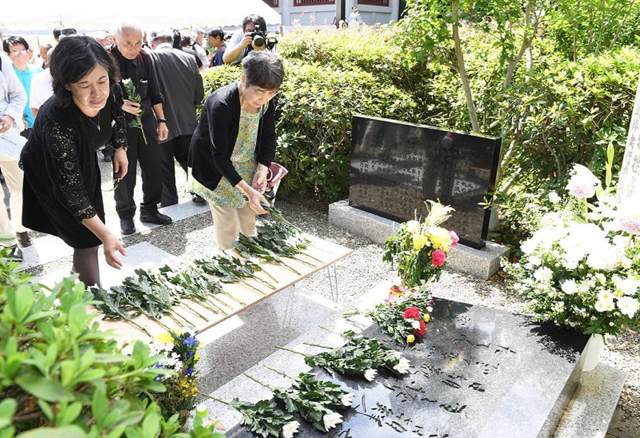Memorial to the Massacre of Koreans in Japan: A Foundation for Coexistence
ASIA--PACIFIC, 1 Sep 2025
The Tokyo Shimbun | Editorial – TRANSCEND Media Service

Memorial for Korean victims of the Japanese 1923 massacre held amid Koike controversy. → See the 6h paragraph in the article below.
26 Aug 2025 – During the Great Kanto Earthquake of 1 Sep 1923 in Japan, many Koreans were massacred due to false rumors. Commemorating the victims means facing up to a “negative history” that must never be repeated, and serves as a foundation for coexistence among people of diverse ethnicities and races. Politicians should be at the forefront of this effort. [Lee says won’t forget sacrifices of ethnic Koreans in Japan] [Koreans in Japan]
Immediately after the earthquake, malicious rumors such as “Koreans threw bombs” and “poisoned wells” spread. Vigilance groups organized by government officials and private citizens killed Koreans across the country. [Un-remembering the Massacre: How Japan’s “History Wars” are Challenging Research Integrity Domestically and Abroad]
In the 2009 report, the Cabinet Office’s Central Disaster Prevention Council estimated the number of the victims at between 1,000 and several thousand. This was one of the largest ethnic genocides in Japan’s modern history.
One hundred two years have passed since the incident, and with the risk of historical facts fading, memorial ceremonies held around the country are an important effort to pass on memories. [Anti-Korean sentiment in Japan] [From colonization to Zaitokukai: the legacy of racial oppression in the lives of Koreans in Japan]
Last year, Chiba Governor Toshihito Kumagai and Saitama Governor Motohiro Ohno each sent their first memorial messages to their local ceremonies. They are currently considering whether to send messages this year, and we urge them to continue doing so.
Tokyo Governor Yuriko Koike has announced that she will not be sending a memorial message to the ceremony in the Sumida Ward this year. Previous governors have sent messages since 1974, and Koike also sent one in 2016, but stopped the following year. They explain that all victims are commemorated together at a separate memorial service, but isn’t this negating the efforts of our ancestors? [Politicians insincere to turn blind eye to massacre of Koreans after 1923 quake] [Saitama, Tokyo governors skip events marking 101 years since anti-Korean massacres] [Tokyo gov. rejects request to attend memorial event for 1923 Korean massacre victims]
The background to the massacre is thought to include shock and fear over the fire, as well as discrimination against people under colonial rule and wariness of anti-Japanese movements. [The 1923 Great Kanto Earthquake: Xenophobia, Misinformation, and the Massacre of Koreans in Japan] [Document sheds light on killings of Koreans after 1923 earthquake]
While the situation is different now, Japan’s declining national power and widening disparities are fueling public discontent and anxiety, and this anger must not once again be directed at foreigners close to home.
In the July House of Councillors election [i.e. Upper House election], Sanseito, which advocated “Japanese people first,” made false claims such as “foreigners are being given preferential treatment,” and its leader, Sohei Kamiya, even used derogatory terms for Koreans. [A Comprehensive Look at the Numerous Statements That Promote Discrimination and War Made by the Representative of Sanseito, Sohei Kamiya, Over the Past 19 Years]
Hate acts against Kurds have been repeated in Saitama Prefecture, and discriminatory posts have also been posted on social media.
During the press conference during the House of Councillors election, Koike expressed concern about xenophobia and hate, saying she “views them as extremely dangerous.”
We commend her for striving for “coexistence” rather than “division.” She should take the fact of the Korean massacre seriously and express her condolences. Her powerful influence as a politician should be used to prevent future atrocities. [Koreans in Japan : a Struggle for Acceptance] [KOREA-JAPAN – Exploring the Untold Stories of the Korean Diaspora]
Notes:
- The hyperlinks were added to the translation article, as mentioned above, by the translator for the convenience of the reader.
- Brackets [ ], with the italic letters after the end of some paragraphs were added by the translator for the convenience of the reader.
- The views and/or opinions expressed in the above-mentioned article are those of The Tokyo Shimbun, which is the original author. Its views and/or opinions do not necessarily reflect those of the Transcend Media Service (TMS) or those of the translator. Therefore, the reader is kindly requested to understand, interpret or judge those views and/or opinions at his or her own responsibility.
________________________________________________
Satoshi Ashikaga is a member of the TRANSCEND Network for Peace Development Environment. Having worked as researcher, development program/project officer, legal protection/humanitarian assistance officer, human rights monitor-negotiator, managing-editor, and more, he prefers a peaceful and prudent life. His previous work experiences, including those in war zones and war-torn zones, constantly remind him of the invaluableness of peace.
Translation: Satoshi Ashikaga – Google Translate
Original in Japanese: <社説>朝鮮人の虐殺 追悼文が「共生」の礎に:東京新聞デジタル
Tags: Asia, East Asia, History, Japan, Massacre, South Korea
This article originally appeared on Transcend Media Service (TMS) on 1 Sep 2025.
Anticopyright: Editorials and articles originated on TMS may be freely reprinted, disseminated, translated and used as background material, provided an acknowledgement and link to the source, TMS: Memorial to the Massacre of Koreans in Japan: A Foundation for Coexistence, is included. Thank you.
If you enjoyed this article, please donate to TMS to join the growing list of TMS Supporters.

This work is licensed under a CC BY-NC 4.0 License.
Join the discussion!
We welcome debate and dissent, but personal — ad hominem — attacks (on authors, other users or any individual), abuse and defamatory language will not be tolerated. Nor will we tolerate attempts to deliberately disrupt discussions. We aim to maintain an inviting space to focus on intelligent interactions and debates.